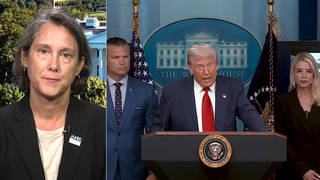The U.N. Security Council voted Monday to deploy multinational armed forces to Haiti as the island nation combats worsening gang violence. The intervention, which came at the repeated request of U.S.-backed Haitian Prime Minister Ariel Henry, will be led by Kenya, marking the first deployment of international security forces to Haiti in nearly 20 years. The proposal received 13 votes in favor, with Russia and China abstaining. The resolution was drafted by the United States and Ecuador, allowing foreign troops to remain in Haiti for one year, with a review after nine months. The Biden administration pledged at least $100 million to fund the foreign operation. This is the United States Deputy Ambassador to the U.N. Jeffrey DeLaurentis.
Jeffrey DeLaurentis: “This mission comes at the request of the Haitian government and Haitian civil society to address the insecurity and dire humanitarian crisis the country has faced for far too long. The deployment of this mission will help to support Haiti’s critical near-term needs and to foster the security conditions necessary for the country to advance long-term stability.”
Kenya had previously offered to contribute 1,000 police officers; the Bahamas, Jamaica, and Antigua and Barbuda have also vowed to send forces. Many Haitians have opposed the move due to the disastrous history of U.N., U.S. and foreign interventions in Haiti. A U.N. mission that withdrew from Haiti in 2017 left behind an outbreak of cholera that killed some 10,000 people. U.N. officials were also accused of widespread sexual violence, including the abuse of children. Amnesty International has voiced concerns about the intervention and Kenyan-led armed forces, recently citing Kenya’s “continued unlawful use of force against protesters.”
Meanwhile, peace activists have denounced the move as a U.S.-led invasion. In 2021, the U.S. special envoy to Haiti resigned to protest the Biden administration’s policies in Haiti. In a resignation letter, the longtime diplomat Daniel Foote wrote, “What our Haitian friends really want, and need, is the opportunity to chart their own course, without international puppeteering and favored candidates but with genuine support for that course.”
No date has been confirmed for the deployment, but U.S. Secretary of State Antony Blnken recently said it could begin within months.











